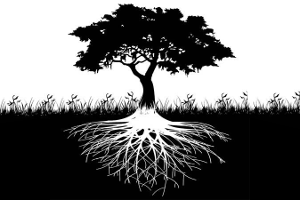



Soul and spirit
 3.0.02
3.0.02 
The Tree of Life

Spirituality is a keyword with quite annoying presence these days. Whether it evokes belly butterflies in some of us, or raises hair of alertness in those more rationally inclined. Naturally I’d try to offer tao-like appeasement, based on personal experience, though instead I’ll focus on another distinction.
Soul and spirit are shot at will nowadays. And interchanged frequently. Concocted rituals of many contemporary communities are abundant in their use (and abuse). Candles, incense, costumes, ... and a bit of spirit, right? The translations of more complex concepts (that some cultures did not start to handle yet) cause even more confusion. Example: "Spiritual life" would be translated into Slovak as spiritual life ("duchovný život"). However, English "inspiritment" or faerie neologism "enspiritment" would meet its meaning in the other language in the "en-soul-ment" ("oduševnenie"). No big deal for the uninterested materialist. "Isn’t it the same process, at the end: woo-woo?" Not much drama for the eager esotericism enthusiast either. "Isn’t it just one of the lovely S-words, at the end?"
Large part of my extracurricular education happened thanks to writings of archetypal psychologists as Thomas Moore or James Hillman. Throughout their works one can recognize body, biological instinct, reason/logic, ego, spirit and soul - as some of the different constituent "agencies" of human being. [My free interpretation.] Rarely they are "at peace", they often present themselves in oppositions and contradiction.
A language of the soul and a key to grasp it (not "to understand it" – understanding is a realm of reason) requires imaginative mind able to read in symbolic level (parables, metaphors, allegories, poetry) – which [my own note] a significant portion of even the intelligent population does not develop, ever. Ironically enough, the offsprings of the technocratic society do not consider this underdevelopment to be a form of being "crippled" though. A perfect bad example of how imaginative mind (and soul) does not operate is a textbook effort to dissect mythopoetic texts in order to find out "what did poet want to say". In the same spirit: rational (dictionary or almanacs style) attempts to perform the analysis of dreams, mechanical psychology intended to figure out and fix a human being, people who come out of cinema and ask "what it was about?" ... are all symptoms of the soul-less society. Spirituality, religion, or even art can be dangerous weapons in heands of "literal folk".
I will sketch soul/spirit distinction in words of Moore’s teacher, James Hillman, in his work "The Soul's Code": The image Hillman uses is of a tree. Call it The Tree of Life if you wish, it’s just a non-literal grasp of the myth. Every human life starts as a seed that contains a code of its unique nature (talent, daimon). The nutrition, climatic or social conditions can influence how we grow up and root down, but still we develop a version of that seed’s code transplanted into circumstances of our life. Acorn seed will always become an oak – small, big, crooked, healthy, striving, magnificent – though still an oak. This touches the concepts of meaning, purpose, self-realization. Part of the tree that appears in the light and grows up – the stem and the crown (spirit) – has its mirror image of sometimes equal size: the root system (soul) - obscured, growing down into the dark earth. Spirituality aims high, with uplifting values. Soul roots into the dirt and decay.
Spirituality can be seen as an enthusiast "yeeeah!". The word spirit roots in Latin for breath. A-spira-tion. A breath of life. Life energy. Zest for life. "Let’s fix the world, let’s make everyone happy, let’s heal every illness, let’s bring down all the walls, let’s make everyone free, let’s swipe all the borderlines, let’s come together, let’s push the limits, let’s overcome ourselves, let’s love everybody." Spirit’s words could be: happy, joyful, forever, together, strong, achieve, create. Spirit is the crown of the tree - growing up, towards the sun, towards light, towards uplifting values, it is the zeal of the life. Spirit - can be personified in ambitious and pure young man (puer archetype) – e.g. in the myth of Icaros, escaping from Crete together with his father, who urged him to fly at low height ... but Icaros ambitiously/carelessly attempted to fly towards the sun, the wax in his wings got melted and he crashed and sank to the depth of the sea. This beautifully paints the spirit-soul / heights-depth interaction. Spirit can be seen as one-dimensional or one-sided, self-indulgent, heroic, it can act as if invincible, immortal. One of the examples of "spirituality" is abrahamic cultural/religious obsession with virginity and purity and asexuality (in some sense). Perhaps monogamy, exclusivity, loyalty, faithfulnes, relationships till death - the forevers. Whenever absolutes and immutable determination is involved.
The soul - as the counter-agent - can aim to restore the balance (or multi-faced-ness). Reminding us, that quite important part of life is happening down, in the less glorious dirt, in dark depths. As it is natural to her, soul does it in a way of metaphor, the literal interpretation of which may not look very alluring.
Soul does not just yell "nooo way!", though. :) Roots of the tree grow into the dark and dirty earth. In this manner soul invites (also) sadness, depression, pain, longing, mortality, failure or darker/dirtier sexuality. If spirit looks into the brighter future (fresh leaves of the crown face the sun), soul enjoys also the past – as the roots feed on the nutrients from the decomposing previous life (processing of life's material). Soul feeds on the memories, on the stories, on the histories - but appreciated in a different sense from the rational analysis and learning. "Stop looking back" ... "do not dig in the past" ... "don’t be sentimental" – are the usual slogans of spiritual society. But the soul needs to be woven (as a thread) into the marvelous fabric of stories that are stretching from the Past (ancestors, personal and family history, successes and failures, patterns, repetition) - through Now - towards the Future. All time, above time. Soul likes memories, old pictures, nostalgia. Nowadays, a very popular spiritualist mantra says: "here and now" - though the soul embraces what is now on the background of what was. If spirit proceeds forward on linear timeline (despiseful of vicious circles that it needs to be break out of), soul can deal with circularity, with repeating motives that are not seen as pathological by it.
If spirit aims for health and action and movement and dynamics – soul’s weather is more diverse and can involve depression (=low pressure, lack of zeal to live, inaction, retreating inwards, sorting out, throwing out) or other illnesses or inhibitions of eager pursuits. Spirit moves forward, soul needs to pause occasionally, go slow, or even stand still, reflect, digest. One of my first spiritual encounters was positive-magic: "take control of your life, think positive, mend what’s broken". It was quite a challenge to get familiar with soul that instead of doing allows also to be done to... or just being. Soul is ready to submit to randomness, surprises or stories, be hijacked by life, work with trouble, obstacles, drama, handicaps, inhibitions, imperfection.
What if the reason wants something, the spirit aims somewhere, but the soul does not approve? If one stubbornly refuses to listen (in the language of her own), she finds pathological ways to pull the breaks – ways that reason won’t explain and spirit won’t appreciate. Reason naturally tries to analyze why spirit or soul does this or that, but it misses the point because it employes its own tool and logic: reasoning :) Spirit also wants everything fabulous and perfect, but it often cannot "recruit" soul on its enthusiast quest either. Soul has different semantics, way of working, motivations. The mystical entity that makes the unique us - multilayered, deep and undecipherable.
One can hardly speak of "enjoyment" and "indulgement" when he falls ill. But the soul - rather than fixing the illness - may need to pass through it, in a ritual of transformation, an act of becoming onself (individuation) - the same way as the climatic conditions test and prove what potential is hidden in the genetic code of the seed. If spirit searches for the elixir of youth (God bless scientific exploring, discoveries and progress), soul does not only appreciate vulnerability, fragility, finality (aging, accidents, handicaps, inhibitions, death), soul is actually our capacity to do so (Goddess bless having human dimension and scale). Spirit likes the idea of Heaven, Paradise, Nirvana (or at least reincarnation – simply it does not want to die), soul is our capacity to acknowledge the passing time and departing, or simply the seasons and the cycles – as the valid constituents of life.
Most of the contemporary religions are truly spiritual. Heal all ails, live eternally, seek the ultimate truth. Light not darkness, life not death, joy not sadness, pleasure not pain. Most of their followers are even the "spiritual materialists" – adhering/sticking/holding onto the dogmas and spiritual values. Spirit draws them up towards Heavens, afterlife, higher vibrations, away from the mortal/sick/imperfect flesh – while soul feeds on the stories experienced within this finite life, within material and sensual world – that is not "miserable" nor "sinful" for her. For spiritualists this life is volatile and short – for soul this is The Life.
Spirit likes monogamy and monotheism ("choosing the right one") – soul is naturally a polytheist pantheon. In Greek rendering: there’s creative/curious/frivolous Zeus, jealous and home-focused Hera, untamed and determined Artemis, hedonist Dionysus, crafty and wise war goddess Athena, phenomenal beauty and love of Afrodite, ... and many others who interact together (as personae of soul) and also enjoy teasing and tormenting mortals. Just try to favor one god and neglect the other – (s)he will teach you a lesson of epic scale. One-dimensional people (workoholics, rationalist, romantics, monotheists, monogamists, artists, pragmatists, idealists) unconsciously invite the stories that inquire into their depth and revive underdeveloped aspect of the self. Drama of life unfolds. The legends can be violent and seemingly tragic, if undestood literally, though juxtaposed with soul’s dramas become tremendous source of insight. Mythopoetic death equals passing from one way of living to another. Transformation is always involved. That’s the language of the soul. Myths, stories, patterns – that sometimes paralyze reason in bewilderment and wonder.
Psyche (soul) is kidnapped by Eros (variously associated with: attraction, love). This sketches the soul’s inclination to erotic life. Taken almost literally, soul can resist the moralizing spirit (purity, virginity, singleminded intentions) through imagination evoked by fetishes and BDSM, or diverse sexuality and sensuality in general. More metaphorically, the term "erotic living" can symbolize passion, depth of involvement, sense of beauty and poetry – that can extend to daily non-sexual activities.
If spirit listens to the sermons in churches/mosques/synagogues, gets inflamed on the content – soul actually enjoys the ritual for its repetitive, familiar and of course symbolic quality. Costumes, rites, the fact of assembling, connection, ceremiony, festivity, warm fuzzy feeling. Soul is quite flexible and its temple can be the cinema (coming to a particular space with particular ambience to hear the contemporary stories - together with others in shared experience), theater, concert, campfire, museum exhibition. The soul craves for the essence found in the core of religion and art alike: imagination, stories, taking perspectives on life, but also sharing, ritual, feast, celebration, conviviality.
Paraffin candle spirituality often appears as an alternative to the dying out dogmatic religions. Though the question is, if such spirituality can feed the soul, or just fuels the spirit? New and artificial rituals can lack the quality of familiarity and ancient-ness that draws us back towards traditional(ism). Past, memories, habits, nostalgia, being set in timeline, story, connections – are qualities of their own. I have witnessed too many empty rituals, with boastful intentions, words flying high, but still somewhat soul-sterile. Passionate activists with ideals often invoke spirit, while forgetting to appreciate the other side, the dark side. They fight for the "good cause" but actualy just perpetuate the fight. Instead of reconciliation and understanding (or rather insight) achieve just what they do – the epic antic war.
Some of us believe that psychology has become a domain of rationalist reason, spirituality is often just a pampering of the spirit, not a genuine care of the soul – which was the original intention in the sacred acts, myths and religion – with their tools: stories, art, beauty, rituals, holy-days and ceremonies. Grow up, but also grow down. Progress but also root in. Less enspiritment and more en-soul-ment, please!
Still, I do not want to present spirit and soul just as the opponents. They are two co-dependent aspects of the living human being (beyond biology, instincts and calculation). Animus and anima. Let’s say spirit pursues values, soul percepts the feelings. Spirit desires and aims, soul lives the stories. As the soul tries to embrace the dynamic "harmony" of its many deities - as many as humankind has devised – even the spirit and soul (and the reason, the ego, the instinct, the body and the others) aspire for balance, beyond black and white, good and bad, right and wrong.
Recommended literature:
The soul: Thomas Moore: Care of The Soul
Language, beauty and prima materia of sickness, death and other ordeals: Thomas Moore: Dark Nights Of The Soul
Love, friendship, communities, connections, sex: Thomas Moore: Soul Mates
BDSM, fetish, dark sexuality: Thomas Moore: Dark Eros
Observation and embracing of life’s contradictions and paradoxes: Thomas Moore: Original Self
Calling, self-realisation, genius, daimon, talent: James Hillman: The Soul's Code






